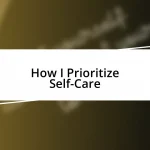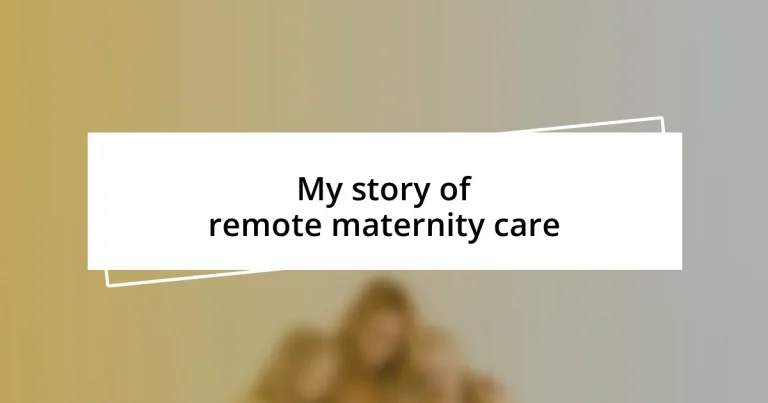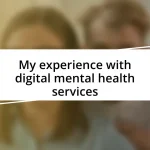Key takeaways:
- Remote maternity care enhances accessibility and convenience for expectant mothers, especially those in rural areas, reducing travel stress and allowing for flexible healthcare access.
- Technology plays a crucial role in remote care, using tools like video consultations, mobile health apps, and wearable devices to provide timely support and monitor health conditions.
- Effective communication is vital in remote care; establishing rapport with healthcare providers through personal sharing and clear questioning enhances the overall experience.
- Challenges include feelings of disconnection during virtual visits, technical issues, and privacy concerns, highlighting the need for secure communication methods and backup plans.
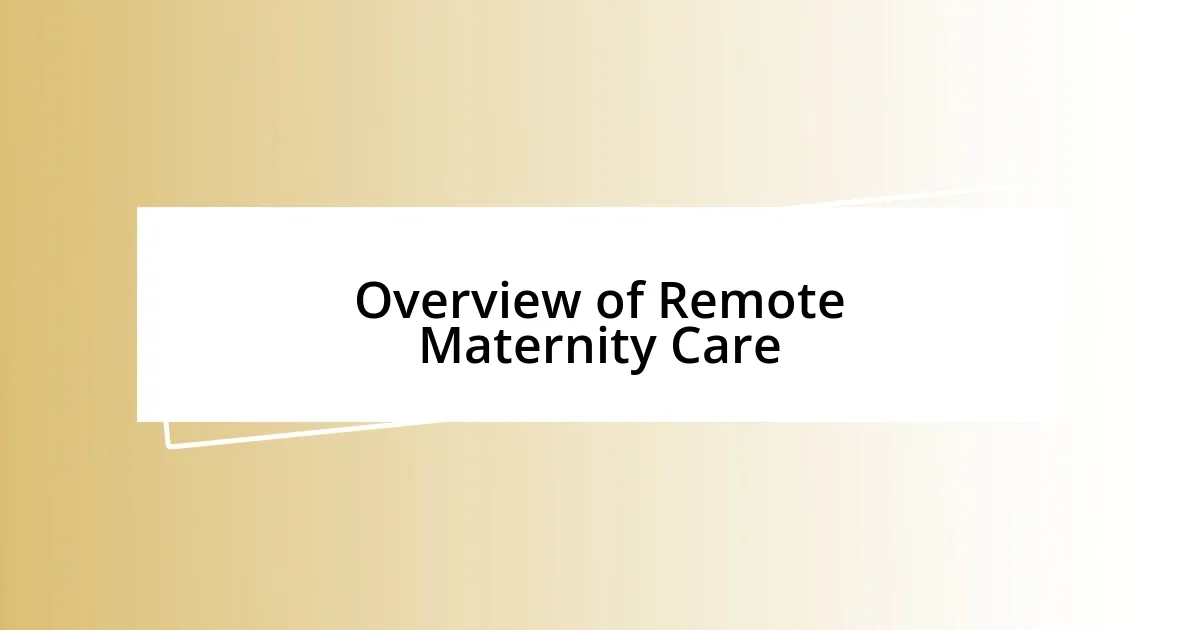
Overview of Remote Maternity Care
Remote maternity care has emerged as a vital solution for expectant mothers, especially during times when traditional in-person visits may pose challenges. I can recall the first time I attended an online prenatal class; I was surprised at how connected I felt to the instructor and other moms-to-be, despite being miles away. This approach has been particularly beneficial for women in rural areas who may struggle to access quality care consistently.
Imagine being able to have a real-time conversation with a healthcare provider from the comfort of your home while managing the uncertainties of pregnancy. I remember how relieved I was when I could ask my doctor questions about my symptoms without the stress of travel or long waiting times. This flexibility allows women to receive personalized support and reassurance, which is sometimes all we need during such a vulnerable phase of life.
Moreover, remote maternity care covers a wide range of services, from routine check-ups to mental health support. For instance, I’ve seen how video consultations can foster deeper discussions about emotional wellbeing, which is often overlooked. Isn’t it comforting to know that with the right technology, nurturing and accessible prenatal care is just a click away?
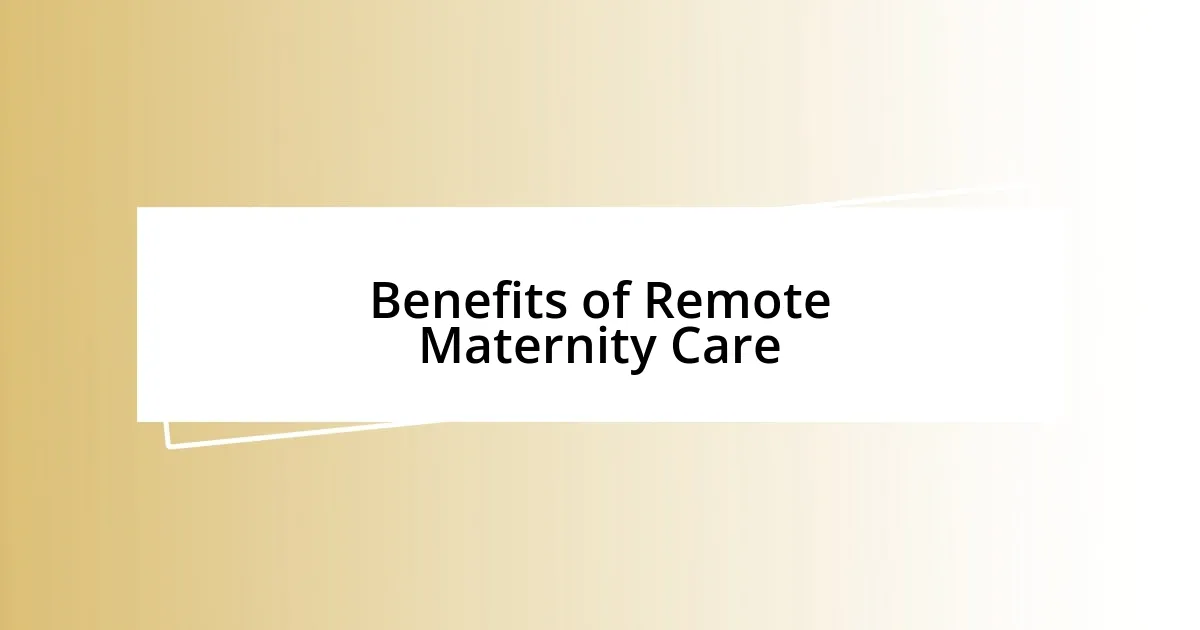
Benefits of Remote Maternity Care
Remote maternity care offers incredible convenience that can significantly enhance the overall experience of pregnancy. In my own journey, I remember how scheduling appointments was often a source of stress. The ability to have virtual check-ups not only saved me time but also allowed me to fit my healthcare into my busy life as an expectant parent. It’s amazing how much peace of mind can come from receiving medical advice without the hassle of travel, especially when you’re trying to balance work, family, and the excitement of preparing for a new baby.
Not only does remote maternity care reduce logistical burdens, but it also opens doors to specialized health services that may otherwise be out of reach. I encountered this firsthand when I needed to consult with a lactation expert. Finding local support felt daunting until I discovered a virtual option that connected me with a knowledgeable professional who guided me through the challenging early days of breastfeeding. This accessibility transforms care by connecting expecting mothers with experts, regardless of geographical barriers.
Additionally, mental wellbeing is often an overlooked dimension in pregnancy. Personally, I’ve found that having the option for remote therapy sessions made a significant difference during my own prenatal journey. Conversations about anxiety and fears became simpler and more accessible, leading to a healthier mindset as I prepared for motherhood. This service is invaluable, encouraging open dialogue about mental health even when we feel isolated.
| Benefit | Description |
|---|---|
| Convenience | Reduces travel and scheduling stress, enabling flexible healthcare access. |
| Accessibility | Provides connections to specialists that may not be available locally. |
| Mental Health Support | Offers vital resources for emotional wellbeing through virtual therapy options. |
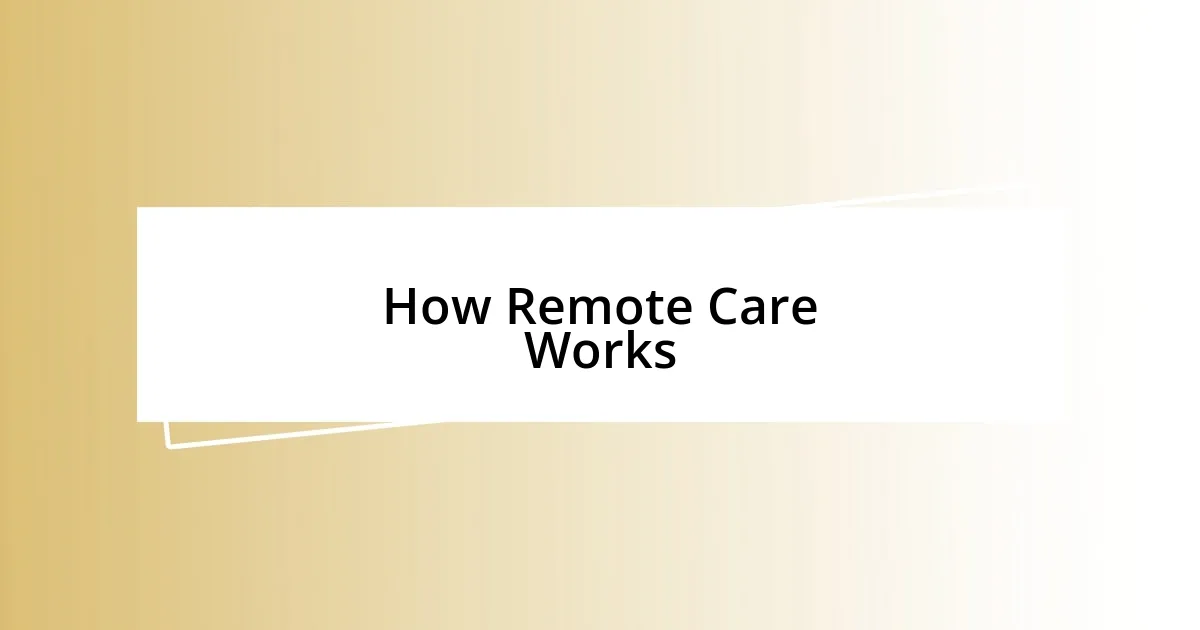
How Remote Care Works
The mechanics of remote maternity care are quite fascinating and, from my experiences, surprisingly effective. Essentially, this system revolves around digital communication tools, which allow expectant mothers to engage with healthcare providers via video calls, messaging apps, and even dedicated health platforms. I distinctly remember the ease with which I could share my concerns about morning sickness during a video consultation, really feeling like I was in the room with my doctor, despite the physical distance. This seamless connection not only alleviates my worries but also ensures that I get timely advice.
Key components of how remote care works include:
- Real-time Consultations: Instant access to healthcare professionals through video or audio calls.
- Mobile Health Apps: User-friendly applications that enable tracking of symptoms, scheduling appointments, and secure messaging with doctors.
- Remote Monitoring Technology: Devices and wearables that transmit health data directly to providers, ensuring ongoing support for both mother and baby.
With technology allowing personalized interactions, I found that even the most challenging questions felt easier to tackle. The experience was transformative, making me realize that with remote care, the distance no longer dictated my access to health services.
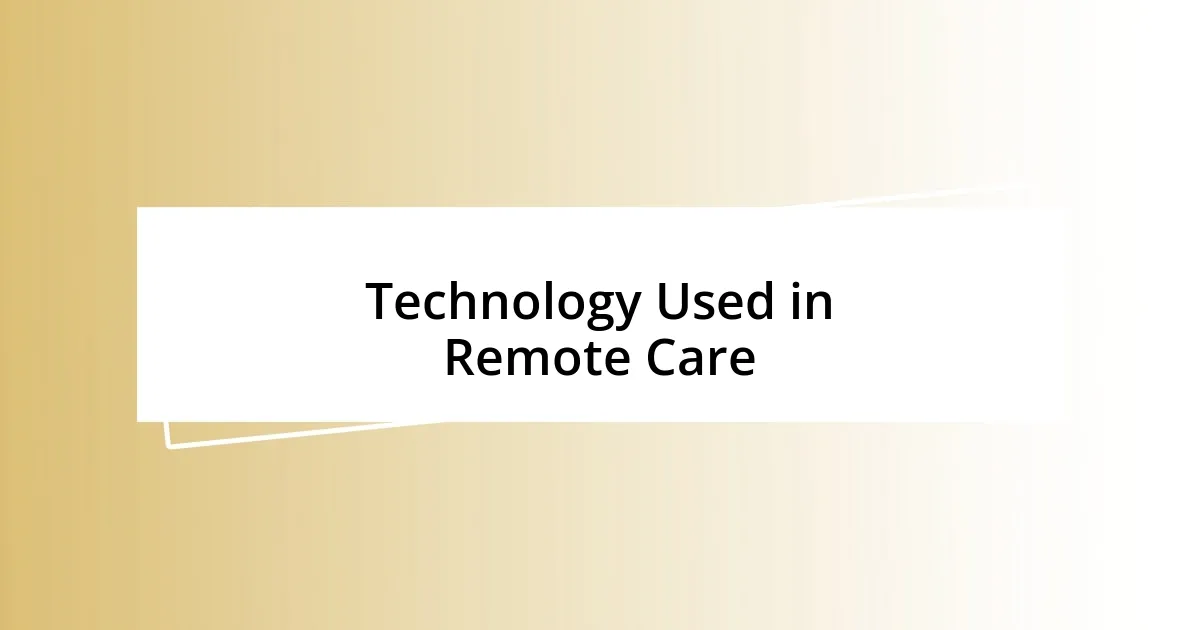
Technology Used in Remote Care
Remote care technology is truly remarkable, and it significantly enhances the quality of maternal health services. During my own pregnancy journey, I used a specialized app that guided me through appointment scheduling and symptom tracking. I remember feeling a sense of empowerment as I could easily log my daily experiences, allowing for in-depth conversations with my provider later on. Isn’t it comforting to have such control over your health data at your fingertips?
Video consultations became my lifeline, especially when those late-night questions popped into my mind. There were moments when I hesitated to reach out, thinking my worries were trivial. However, during one of those calls, I was pleasantly surprised by how my doctor not only listened but also empathized with my experiences, making me feel seen and valued. Technology transformed those fleeting thoughts into meaningful dialogues, turning what could have been isolation into connection.
Another standout feature for me was the use of wearable devices that monitored my vital signs. I never realized how handy such technology would be! One day, while wearing a simple monitor, I got an alert about my heart rate. It prompted me to reach out to my healthcare provider immediately. This proactive approach not only put my mind at ease but also emphasized how technology can truly act as a safety net, keeping both mother and baby in safe hands. Isn’t it incredible how a small device can make such a big difference?
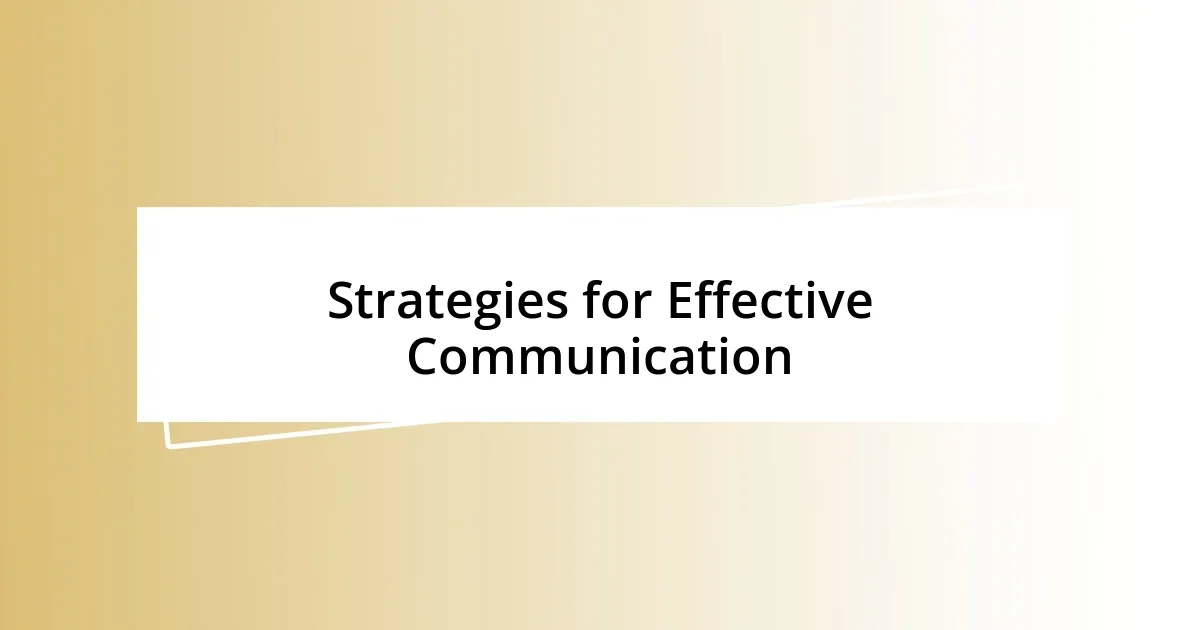
Strategies for Effective Communication
Effective communication is the backbone of any successful remote maternity care experience. I vividly recall a time when I received a text reminder for an appointment, followed by a friendly message from my doctor checking in on my wellbeing. It felt like a warm hug in digital form, reinforcing that my health mattered and reminding me I wasn’t navigating this journey alone. This personal touch turns virtual consultations into heartfelt connections, creating an atmosphere where I felt comfortable bringing up any concerns.
Building rapport with my healthcare provider was key to my experience. During video calls, I found that sharing small details about my daily life helped bridge the gap. Once, I mentioned my struggle with insomnia, and that opened up a deeper discussion about mental wellness in pregnancy. My doctor’s attentive listening not only validated my feelings but also guided me to effective coping strategies. Isn’t it amazing how an open conversation can lead to such profound insights?
In my journey, I learned that visual cues during video consultations made a significant difference too. Using a notebook to jot down my questions before each call not only organized my thoughts but also helped me feel more empowered during our discussions. I remember one time simply holding up a note asking about a specific symptom—my doctor’s response was immediate and reassuring. This strategy transformed what could have been a muddled conversation into a clear and constructive dialogue. Don’t you agree that clarity is key, especially when discussing something as vital as maternal health?
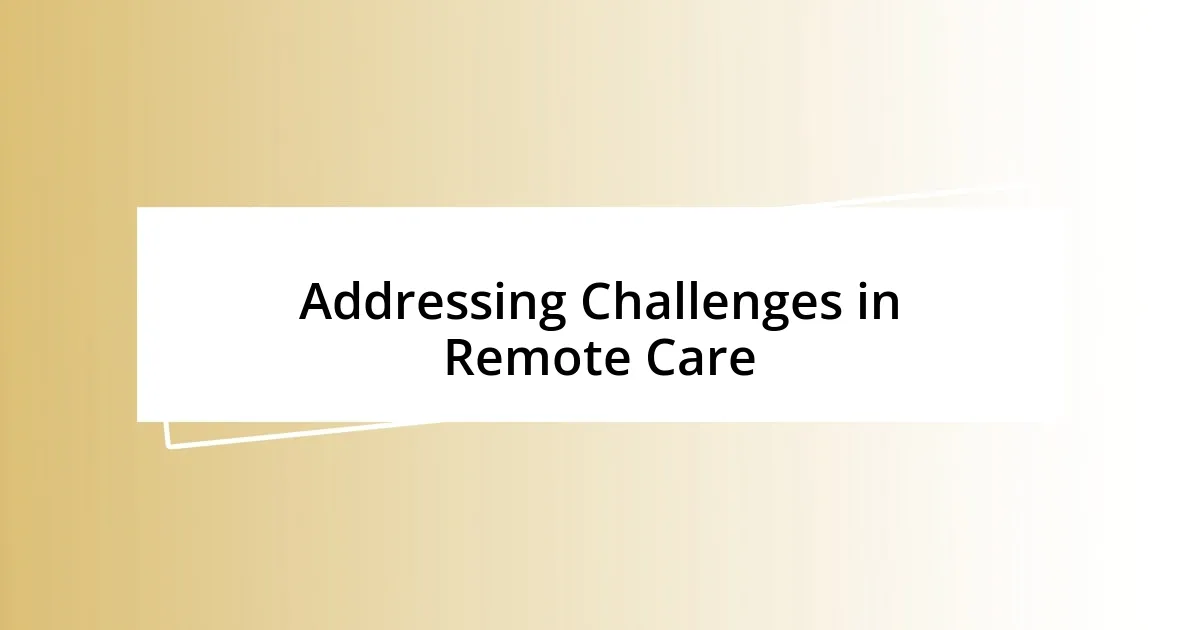
Addressing Challenges in Remote Care
Despite the benefits of remote care, it does come with its own set of challenges. I remember grappling with the initial awkwardness of video calls, feeling disconnected from my doctor despite being physically present on screen. There were moments when I’d pause, hoping to catch a glimpse of their facial expressions to gauge their reactions. It’s intriguing—how can we maintain that warm, personal connection when all we have is a screen?
Technical difficulties can also throw a wrench in the discussion. There was a day when my internet connection faltered right before a crucial appointment. I felt a wave of anxiety wash over me—what if I missed important information? Thankfully, my provider offered a quick follow-up via a phone call later on, but I couldn’t help but wonder how many others might get left in the lurch during similar situations. This experience made me realize the importance of having backup communication plans in place.
Then, there’s the issue of privacy. As much as I cherished the convenience of remote consultations, there was a nagging worry about sharing sensitive information over digital platforms. I often found myself asking, “Is my data really secure?” This made me value practices like end-to-end encryption even more, as they transformed my hesitations into a more confident openness. How would you feel discussing something so personal without those reassurances? It’s nevertheless crucial for maternal health providers to prioritize security to foster trust in this evolving landscape.









